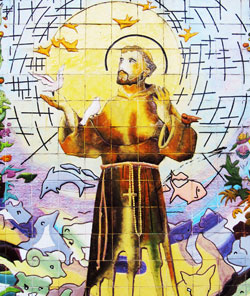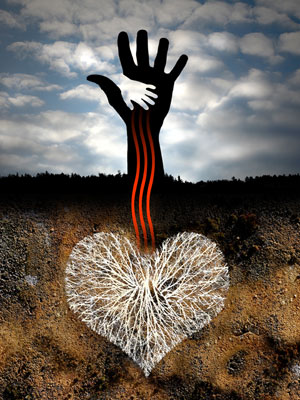Contributed by Scott Mims, Virginia Beach, VA
Warm-up Questions
- Who is the most famous or important person you have ever met, and what was the experience like? Or alternatively, if you could spend an afternoon with any one real person, currently alive or from the past, who would it be and why?
- What is the most meaningful part or worship for you? What makes it so meaningful?
Who Needs Christ?
 Amidst all of the holiday advertising last month, one Times Square billboard drew national attention. Sponsored by American Atheists, its message sparked a lot of coverage and debate, both in the news and online, with one New York State Senator calling for it to come down. The following is an excerpt from the press release which accompanied the billboard’s launch:
Amidst all of the holiday advertising last month, one Times Square billboard drew national attention. Sponsored by American Atheists, its message sparked a lot of coverage and debate, both in the news and online, with one New York State Senator calling for it to come down. The following is an excerpt from the press release which accompanied the billboard’s launch:
Using motion graphics, the billboard proclaims, “Who needs Christ during Christmas?” A hand crosses out the word “Christ” and the word “NOBODY” appears. The display then says “Celebrate the true meaning of Xmas” and offers a series of cheery words: family, friends, charity, food, snow, and more. The commercial ends with a jovial “Happy Holidays!” from American Atheists and displays the organization’s website.
Now that January has come and our schedules and lives are getting back to some sort of post-holiday “normal,” it may be hard to think in terms of Christmas. But the question posed by the billboard is an important one for us to think about. “Who needs Christ during Christmas?” Or even more simply, “Who needs Christ at all?” Increasingly people in our culture agree with the sign’s message. Roughly one fifth of adults in the U.S. – and a third of young adults under 30 – claim no religious affiliation. Yet the witness of the Scriptures is that God is indeed present and active in our world and in our lives, and so during these Sundays after Epiphany we focus on exploring who the baby in the manger is and why and how his birth is good news for all people.
Discussion Questions
- What are your reactions to the message of this billboard? What do you think its sponsors are trying to say and how do you feel about that?
- Many people these days claim to be “spiritual but not religious.” What do you think that means?
- What are some of the reasons that people might have for not being “religious?” For not being spiritual?
- Can you be a follower of Jesus without being religious? Without being spiritual?
- Have you ever experienced a negative reaction or “push back” from other people because of your faith? If so, how did you handle the situation?
Scripture Texts (NRSV) for Sunday, January 19, 2014 (Second Sunday after Epiphany)
(Text links are to Oremus Bible Browser. Oremus Bible Browser is not affiliated with or supported by the Evangelical Lutheran Church in America. You can find the calendar of readings for Year C at Lectionary Readings.)
For lectionary humor and insight, check the weekly comic Agnus Day.
Gospel Reflection
Who is John the Baptist? Who is Jesus? Who are we? These are some of the questions that John (the gospel writer) addresses today as we continue our journey through the Epiphany season.
So first, who is John the Baptist? Despite his great popularity and powerful appeal as a preacher and prophet, John is not the Messiah. We hear this quite plainly, both in the opening words of the gospel (Jn. 1:6-9) and in John the Baptist’s own reply to those who come seeking to know what he is up to (Jn. 1:19-23). Rather, John is “the voice of one crying out in the wilderness, ‘Make straight the way of the Lord.’” As such, his divine purpose is to reveal to Israel – and ultimately to the world – the Messiah (Jn. 1:31)
What then does John reveal? First, that the person whom he was sent to make known is Jesus and that Jesus is “the Lamb of God who takes away the sin of the world.” Two times John uses this image to describe Jesus in today’s gospel. It is an image that has connections both to the sacrificial system surrounding the Jewish Temple and to the Exodus event in which the blood of a lamb caused the final plague to pass over the households of the Israelites. What’s more, Jesus will be crucified for the sake of the sin of the world on the day in which the Passover lambs are slaughtered (Jn. 19:14, 31, 42). This central part of Jesus’ identity is what we often sing about during Holy Communion after the bread and wine have been consecrated: “Lamb of God, you take away the sin of the world, have mercy on us….”
Jesus is also the one upon whom the Holy Spirit descends and remains. Unlike last week’s gospel reading from Matthew, we do not actually get to witness Jesus’ baptism in John’s gospel. Instead, we hear John the Baptist’s witness – his testimony about Jesus – as sort of a flashback. For John himself, this was the sign that he was looking for (Jn. 1:33). Not only is the Holy Spirit the marker of Jesus’ true identity and the power of God at work in and through him, the Spirit is the gift the Jesus gives to those who believe and follow him (Jn. 20:21-23).
Finally, in terms of who Jesus is, John makes an astounding claim: “And I myself have seen and have testified that this is the Son of God.” In my congregation we read the opening section of John’s gospel as part of our candlelight services on Christmas Eve. In a darkened sanctuary illuminated by the glow of a hundred or so candles we hear about the Word of God becoming flesh, about the One who is the “true light” of the world, about God’s only Son through whom we have all received grace upon grace. John the Baptist points to Jesus as being this One. It is a claim, of course, that many today deny.
Which brings us to the third question this passage addresses: Who are we? In the second part of our gospel reading John the Baptist’s witness – his sharing of his faith in who Jesus is – moves two of his own followers to find out more about this “Lamb of God.” Seeing them following him, Jesus asks them, “What are you looking for?” For all who read John’s gospel, this is more than simply a casual question. It is a question that we are asked, too. When it comes to the future, when it comes to our lives, when it comes to Jesus, what are we looking for? And, like the two disciples, are we ready to accept Jesus’ invitation to us to “Come and see?”
So, what did they “see” when they were with Jesus that day? We aren’t told, only that, whatever it was, it led these two seekers to a point where it was no longer John’s witness but their own experience of being with Jesus that caused them to follow him. One of them, Andrew, is so moved that he, in turn, also becomes a witness, inviting his brother, Simon to come and see. Simon, who we also know as Peter, became one of the most central disciples in the whole gospel story. At this point there is a lot yet to happen before he truly begins to understand what it means for Jesus to be Lamb of God and Messiah.
Perhaps that is also something for us to take away from our gospel for this week. It is not perfection in understanding or completeness of knowledge that John (the gospel writer) is aiming for in his account of God’s great love for us in Jesus. John is aiming for faith – that we might come to believe in Jesus ourselves and, in believing, to discover true and abundant life. Here, by the Jordan River, he looks back to the very beginning, to the mysterious and powerful proclamation of his opening words, and, at the same time, forward to the cross, to the very place where the image of Jesus as Lamb of God finds its fulfillment.
Discussion Questions
- The following are some of the titles and epithets that people have given to Jesus. Which one(s) is (are) most meaningful to you? Why?
Son of God Emmanuel Prince of Peace Man or Sorrows
Good Shepherd Lamb of God Friend of Sinners Teacher
Lord Light of the World Bread of Life Messiah
- Who in your own life has shown / brought you to Jesus? In what ways have they witnessed to their faith?
- John the Baptist’s role was to point other people to Jesus. If, as they say, actions speak louder than words, what are some practical, real-life ways that you might help other people know about Jesus and experience his love?
- Why do you need Jesus?
Activity Suggestion
Act out the gospel lesson. Try to imagine why Andrew is so eager to introduce others to Jesus. What about Jesus do you think made him so excited that he couldn’t wait to tell Simon Peter? Have you ever had the chance to invite someone else to “Come and see?” If so, how did it go? Have those acting other parts give typical reactions to talking about Jesus with friends and acquaintances. Talk about how this story might be seen as a model for doing evangelism.
Closing Prayer
Gracious and loving God, in the waters of baptism you name us and claim us and make us your very own. Thank you for your love and for the forgiveness and new life that is ours through Jesus. As we seek to be his followers in our often messy and complicated world, place into our lives people and events who will remind us of who and whose we truly are. Help us, in turn, to be living signs of your love and grace in the lives of those around us. In Jesus’ name we pray. Amen.




